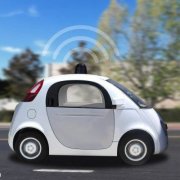"A startup called iSee thinks a new approach to AI will make self-driving cars better at dealing with unexpected situations.
- by Will Knight
Boston’s notoriously unfriendly drivers and chaotic roads may be the perfect testing ground for a fundamentally different kind of self-driving car.
An MIT spin-off called iSee is developing and testing the autonomous driving system using a novel approach to artificial intelligence. Instead of relying on simple rules or machine-learning algorithms to train cars to drive, the startup is taking inspiration from cognitive science to give machines a kind of common sense and the ability to quickly deal with new situations. It is developing algorithms that try to match the way humans understand and learn about the physical world, including interacting with other people. The approach could lead to self-driving vehicles that are much better equipped to deal with unfamiliar scenes and complex interactions on the road.
...
iSee is built on efforts to understand how humans make sense of the world, and to design machines that mimic this. Zhao and other founders of iSee come from the lab of Josh Tenenbaum, a professor in the department of brain and cognitive science at MIT who now serves as an advisor to the company.
Tenenbaum specializes in exploring how human intelligence works, and using that insight to engineer novel types of AI systems. This includes work on the intuitive sense of physics exhibited even by young children, for instance. Children’s ability to understand how the physical world behaves enables them to predict how unfamiliar situations may unfold. And, Tenenbaum explains, this understanding of the physical world is intimately connected with an intuitive understanding of psychology and the ability to infer what a person is trying to achieve, such as reaching for a cup, by watching his or her actions."
Read the full story on Technology Review's website using the link below.

